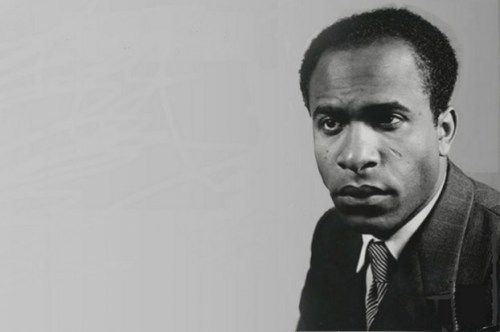6 New Books
Emphasise the
Continued Importance
of Frantz Fanon
An article from Books Live.
Psychiatrist, philosopher and revolutionary Frantz Fanon (1925 – 1961) is one of the most important intellectuals of the 20th century. Born on the island of Martinique, he lived in France, Algeria, Tunisia, and numerous places in between, before dying of cancer in the United States.
If you’ve read Black Skin, White Masks (1952), A Dying Colonialism (1959), The Wretched of the Earth(1961), and Toward the African Revolution (1964), get stuck into these secondary sources to round out your knowledge of the man and his work.
1. A Jacana Pocket History: Frantz Fanon: Towards a Revolutionary Humanism by Christopher J Lee
Christopher J Lee, a research associate at the Wits Institute for Social and Economic Research (WISER) with a PhD in African history from Stanford University, is the editor of Making a World after Empire: The Bandung Moment and Its Political Afterlives (2010), which was recently shortlisted for the 2015 Africa-Asia Book Prize, and the author of Unreasonable Histories: Nativism, Multiracial Lives, and the Genealogical Imagination in British Africa (2014).
In this biography, he seeks to demythologise Fanon by situating his life and ideas within a broad historical context. The book combines a range of secondary literature with first-hand readings of Fanon’s work, and argues for the complexity of Fanon’s work. More about the book
2. Fanonian Practices in South Africa: From Steve Biko to Abahlali baseMjondolo by Nigel Gibson
Nigel Gibson is a leading Fanon scholar. Born in London, he was an active militant in the UK Miners’ Strike in the mid-1980s, and also collaborated with South African exiles from the Black Consciousness Movement, developing some influential academic work on the movement. In 2009, he received the Caribbean Philosophical Association’s Frantz Fanon Prize for Fanon: The Postcolonial Imagination. Edward Said said of the book: “Caricatured as a mindless apostle of violence, Fanon emerges in Nigel Gibson’s rigorous and subtle analysis as a major humanistic thinker about injustice, a serious critic of nationalism and, for the first time, as an impressively profound philosopher of modern post-colonial politics and culture.”
Fanonian Practices in South Africa: From Steve Biko to Abahlali baseMjondolois a sophisticated attempt to examine post-apartheid South Africa through the emancipatory lens of Fanon’s revolutionary humanism. More about the book
3. What Fanon Said: A Philosophical Introduction to his Life and Thought by Lewis Gordon
Lewis Gordon is Professor of Philosophy and Africana Studies at the University of Connecticut, Storrs; European Union Visiting Chair in Philosophy atUniversité Toulouse Jean Jaurès, France; and Nelson Mandela Distinguished Visiting Professor at Rhodes University, South Africa.
What Fanon Said received high praise from none other than Ngugi wa Thiong’o: “In the hands of Lewis Gordon, What Fanon Said becomes what Frantz Fanon says to us today. The book brings alive the revolutionary thought and practice of Fanon into the continuing struggles for structural economic, political, social and psychic transformations of our world. The struggle against anti-black racism is an integral part of it and Gordon’s Fanon is the many-sided thinker who saw it all and gave it words of fire.” More about the book
4. Frantz Fanon: A Biography by David Macey
David Macey, who was born in Sunderland in the UK, the son of a miner who went down the pit aged 14. He translated over 20 books from the French, and was the author of Lacan in Contexts (1988), the acclaimed The Lives of Michel Foucault. He died in 2011.
Frantz Fanon: A Biography is a comprehensive and eloquent account of Fanon’s personal, intellectual and political life, considered by many to be the definitive biography. It is a reflection on the politics and society of France and Algeria, and the intricacies of Fanon’s anti-imperialism and of postcolonial thought. First published in 1998, this edition is updated with new historical material.
5. Frantz Fanon: Philosopher of the Barricades by Peter Hudis
Peter Hudis is Professor of Philosophy and Humanities at Oakton Community College. With Frantz Fanon: Philosopher of the Barricades, he challenges the prevailing belief that Fanon’s contributions to modern thought can be wholly defined by an advocacy of violence.
Hudis presents Fanon’s work as an integrated whole, showing that its nuances can only be appreciated in light of his efforts to fuse philosophical theory and practice.
The author quotes Fanon from his first book, Black Skin, White Masks: “I’m not the bearer of absolute truths”, and argues that rather than develop a grand theory that resolved the contradictions of race and class, Fanon theorised from the vantage point of his lived experience.
6. Voices of Liberation: Frantz Fanon by Leo Zeilig and Mireille Fanon-Mendes-France
Part of the HSRC Press Voices of Liberation, this book contains a foreword written by Fanon’s daughter, Mireille Fanon-Mendes-France, explaining what she believes to be the continued importance of her father’s writings and politics. Fanon-Mendes-France is the president of the Frantz-Fanon Foundation.
The book includes a view of Fanon’s life, the period he lived in and a selection of his work; also interviews with those who fought with him in the struggle against French colonialism in Algeria and Tunisia. More about the book
For the original report go to http://bookslive.co.za/blog/2015/11/13/6-new-books-emphasise-the-continued-importance-of-frantz-fanon/


